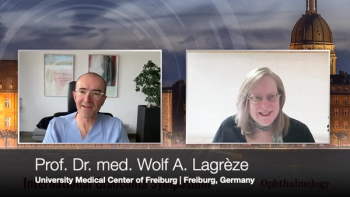
ARVO 2024: Study validates ChatGPT 4.0 as potential uveitis patient resource
In a presentation at the Association for Research in Vision and Ophthalmology’s 2024 Annual Meeting in Seattle, Washington, researchers used Google’s recommended top 8 uveitis patient educational websites in the study to determine whether ChatGPT 4.0 could be used as a uveitis patient online resource.
Patients today increasingly turn to online resources for healthcare information as technology and the internet continue to advance.
In a study presented at the Association for Research in Vision and Ophthalmology’s (ARVO) 2024 Annual Meeting in Seattle, Washington, researchers investigated whether ChatGPT 4.0 could be used as a uveitis patient online resource.1
According to a news release, Saeed Mohammadi, MD, a visiting scholar in the laboratory of Quan Dong Nguyen, MD, MSc, FARVO, FASRS, at the Byers Eye Institute, Stanford University in California, together with a team of scientists from Nepal, Singapore, South Korea and India, used Google’s recommended top 8 uveitis patient educational websites in their study. They collected information from the National Health Service, Cleveland Clinic, Healthline, Mayo Clinic, National Eye Institute (NEI), WebMD, Ocular Uveitis and Immunology Foundation and the American Academy of Ophthalmology (AAO).1
The researchers noted that similar queries from those websites were submitted to ChatGPT 4.0, requesting both standard responses and simplified responses. Vitreoretinal specialists were then asked to grade all the recorded contents without prior knowledge about the source, for accuracy, comprehensiveness and personal preference. The researchers noted in the news release 6 readability tools were used to evaluate how easily the information could be understood.
According to the news release, the study’s results showed that the specialists preferred the standard ChatGPT responses, perceiving them as more comprehensive but also comparable in accuracy levels to other websites. The readability tools revealed that the standard ChatGPT responses would require a higher educational level for understanding whereas the simplified ChatGPT responses would require a lower educational level compared to the existing websites.1
Mohammadi concluded in the news release that it is important to “[ensure] that” the “information” provided by online resources “is both accurate and accessible to individuals with varying levels of education can be challenging. ChatGPT has demonstrated its ability to provide reliable, accurate, and easily understandable information on uveitis, tailored to patients’ educational level."
Reference
1. The Association for Research in Vision and Ophthalmology-. www.arvo.org. Accessed May 5, 2024. https://www.arvo.org/About/press-room/press-room/study-validates-ChatGPT-4.0-as-uveitis-patient-resource/
Newsletter
Don’t miss out—get Ophthalmology Times updates on the latest clinical advancements and expert interviews, straight to your inbox.





























